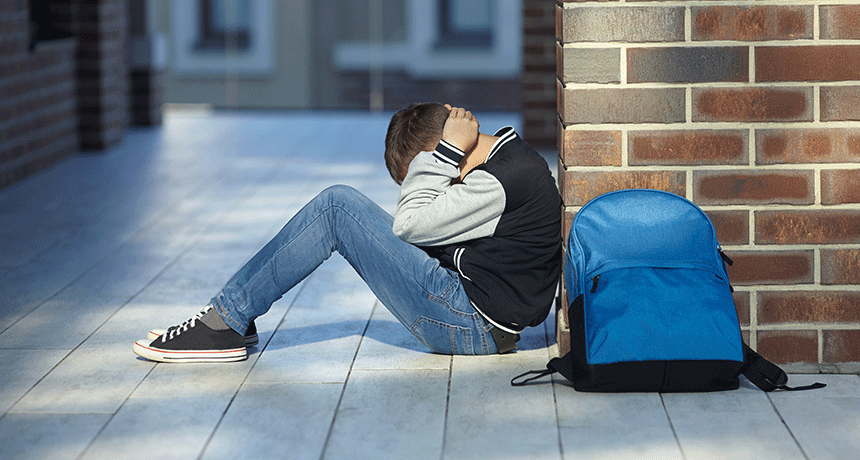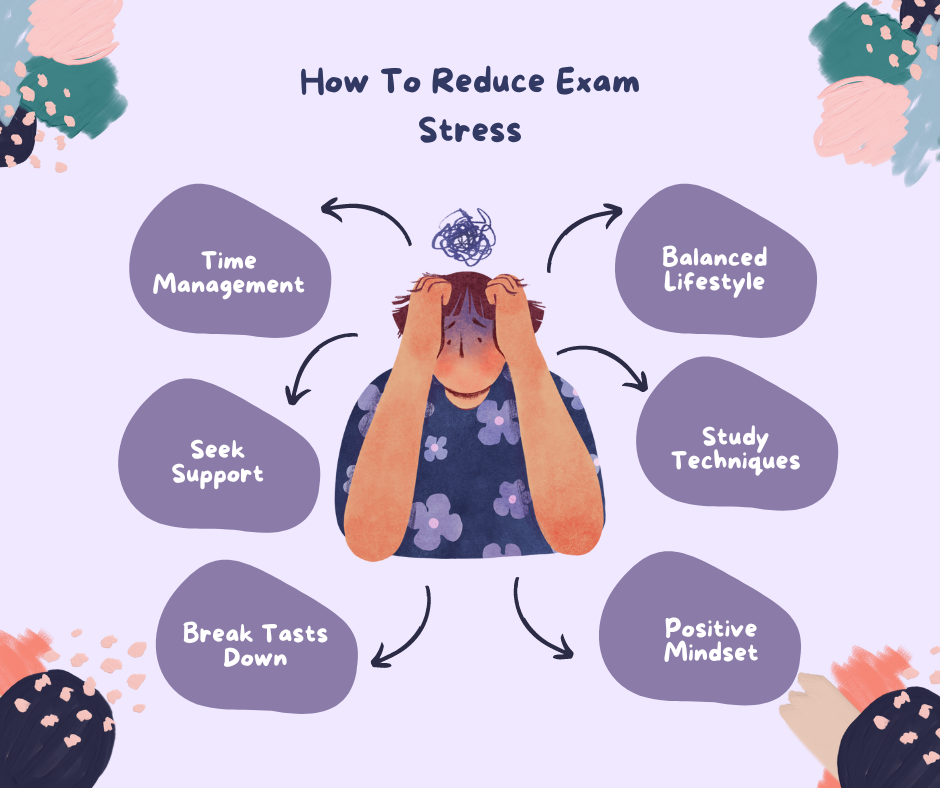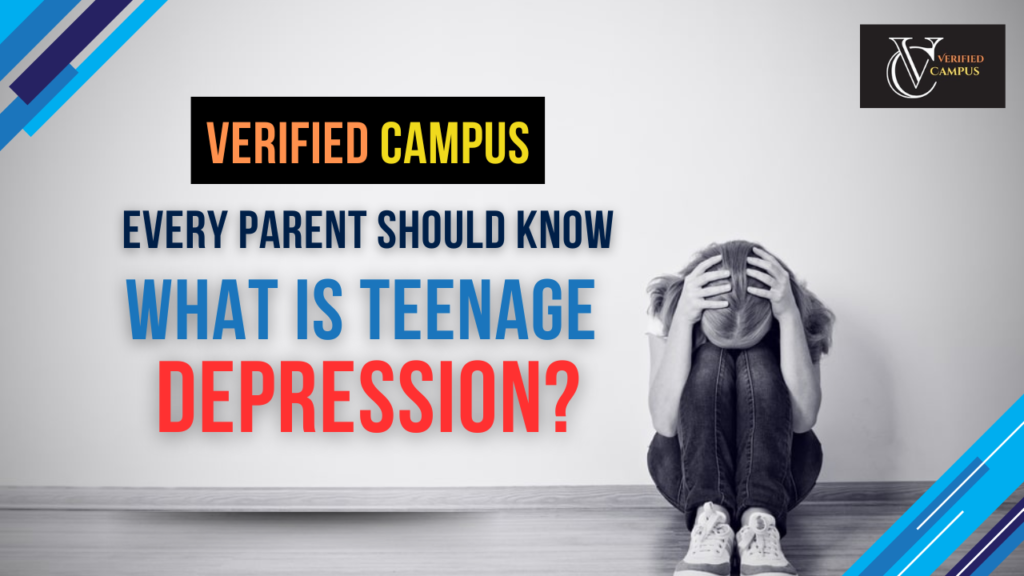Adolescence is a transformative phase marked by emotional, physical, and psychological shifts. While mood swings are common, it’s crucial to distinguish them from more serious concerns like Symptoms of Teenage Depression, which often go unnoticed. These symptoms can appear subtly—through declining academic performance, low energy, or withdrawal from social interactions—and are frequently mistaken for typical teen behavior, leading to delayed support and long-term consequences.
At Verified Campus, we emphasize the importance of early recognition and understanding of these signs. By equipping parents, educators, and school leaders with the knowledge to identify the Symptoms of Teenage Depression, we can ensure timely intervention and create supportive environments where teens feel seen, heard, and valued.
What is Teenage Depression?
Teenage depression is more than occasional sadness or emotional outbursts. It’s a mental health disorder characterized by a persistent sense of hopelessness and a loss of interest in activities. One of the key challenges is recognizing the Symptoms of Teenage Depression, especially when teens themselves may not understand what they are feeling.
Biological changes, peer pressure, academic stress, and family dynamics all contribute to depression during adolescence. The intensity of these feelings can be overwhelming, and without proper guidance, teenagers often suffer in silence.

Behavioral Changes as Early Warning Signs
One of the most visible Symptoms of Teenage Depression is a noticeable shift in behavior. Teens may become withdrawn, irritable, or apathetic. They might isolate themselves from friends and family, skip classes, or lose interest in hobbies they once enjoyed.
In many cases, these behavioral changes are brushed off as “just a phase.” However, when they persist for weeks or affect daily functioning, they should be treated as serious signs of depression.
Emotional and Psychological Indicators
Another category of Symptoms of Teenage Depression includes emotional symptoms like prolonged sadness, anxiety, guilt, and worthlessness. These feelings can result in a constant sense of emptiness and lead teens to believe that their future holds no hope.
Psychological effects may also manifest in the form of difficulty concentrating, making decisions, or remembering things. When combined, these symptoms can severely impair a teen’s academic and social life.
Physical Symptoms You Shouldn’t Ignore
Depression doesn’t only affect the mind; it can also impact the body. Symptoms of Teenage Depression may include changes in appetite or weight, sleep disturbances, fatigue, and unexplained aches or pains. These physical complaints are often the first signs noticed by parents or teachers.
Unfortunately, these symptoms are frequently misunderstood or misdiagnosed, especially in teens who are otherwise physically healthy. Regular medical checkups and mental health screenings can help identify these red flags.
Academic Struggles and Withdrawal
Teenagers battling depression may show a sudden drop in academic performance. Assignments are left incomplete, grades decline, and school attendance becomes irregular. These academic changes are common Symptoms of Teenage Depression that teachers should be trained to recognize.
In severe cases, students may completely lose interest in school and disengage from all learning activities. This withdrawal can compound the problem by leading to feelings of failure and inadequacy.
Social Isolation and Relationship Issues
Depressed teens often have difficulty maintaining friendships and familial relationships. One of the most concerning Symptoms of Teenage Depression is sudden social withdrawal. They may feel misunderstood or disconnected from others, leading to increased isolation.
This disconnect can extend to digital platforms as well. Even though a teen might be active on social media, they may not engage meaningfully with peers. Monitoring not just usage but also the nature of online interactions can provide insights into their mental state.
Risk-Taking Behavior and Self-Harm
As depression deepens, some teens may engage in risky behaviors as a cry for help or a way to escape emotional pain. This includes substance abuse, reckless driving, or unsafe sexual practices. More severe Symptoms of Teenage Depression include self-harm or suicidal thoughts, which require immediate intervention.
Parents and educators must treat these signs seriously and seek professional help. School counselors and psychologists should be equipped to handle crisis situations and provide ongoing support.
Connection with Exam Stress and Anxiety
Many Symptoms of Teenage Depression are intensified during examination periods. The pressure to perform, fear of failure, and competitive academic environments often lead to emotional breakdowns.
This brings us to closely related issues such as Overcoming Exam Anxiety and strategies on How to Overcome Exam Stress and Anxiety. While these conditions are not the same as depression, they often coexist and can trigger or worsen depressive symptoms in teenagers.
Encouraging healthy study habits, emotional regulation techniques, and open communication can help teens manage these challenges better.

Role of Parents, Teachers, and Schools
Recognizing the Symptoms of Teenage Depression early can significantly improve outcomes. Parents should foster open communication and create a safe space for their teens to express emotions. Similarly, schools must have trained staff who can identify symptoms and offer initial counseling or referrals.
Mental health awareness campaigns, wellness programs, and peer support groups should be integrated into school systems to normalize discussions around teenage mental health.
The Importance of Timely Intervention
Ignoring the Symptoms of Teenage Depression can lead to long-term consequences, including chronic mental health issues, academic failure, and impaired social skills. The earlier the intervention, the better the chances of recovery.
Interventions can range from counseling and cognitive behavioral therapy to medication in severe cases. Family involvement is critical, as is a consistent support system within the school environment.
How to Support a Depressed Teenager
If you suspect a teenager is exhibiting Symptoms of Teenage Depression, the most important thing you can do is listen without judgment. Offer your support, suggest speaking to a mental health professional, and avoid minimizing their feelings.
Schools should also conduct regular workshops and mental health screenings to ensure that struggling students do not go unnoticed. Empathy, awareness, and professional care can make all the difference.
Conclusion: Let’s Talk About It More, Not Less
Identifying and addressing the Symptoms of Teenage Depression is not a one-time task but an ongoing commitment from parents, educators, and institutions. Schools prioritizing student mental health alongside academics create safer and more nurturing environments.
At Verified Campus, we aim to promote institutions that not only focus on academic excellence but also ensure emotional well-being. Whether you’re researching the best girls schools or evaluating mental health support systems, remember that a school’s true value lies in its ability to care for the whole student.


